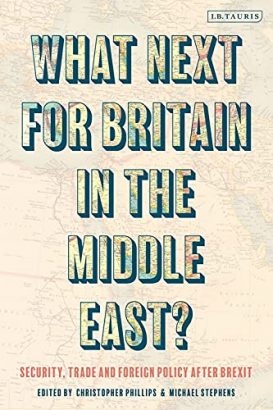What Next For Britain in the Middle East: Security, Trade and Foreign Policy after Brexit (I.B Tauris, 2021), edited by Michael Stephens and Christopher Phillips, is an important examination of UK policy in the region. Contributors include leading specialists in the field from both universities and from institutions such as RUSI, Chatham House and the Foreign and Commonwealth Office: Rosemary Hollis, Michael Clarke, Ian Black, Christopher Phillips, Jane Kinninmont, Michael Stephens and Gareth Stansfield. The book seeks to explain and re-assess the declining Western influence and continued instability in the region and what this means for the UK’s priorities and strategy towards the Middle East. In early January 2022 Fathom deputy editor Sam Nurding sat down with Michael and Christopher to discuss the volume.
Introduction
Samuel Nurding: What were your motivations for creating this collection of essays and what impact do you hope to have?
Christopher Phillips: The genesis of the book came about during a very long bus journey in Lebanon in 2017 when Michael and I had been invited to dinner at the house of the former President in Lebanon. As we sat in gridlocked traffic we discussed the Brexit vote and the effect it might have on the UK’s engagement in the Middle East. That discussion snowballed into another: ‘What does the UK want to do in the Middle East?’ And then there is the question we ask in the book: does any of this matter anymore? The world is changing, the Middle East is changing, and the UK has smaller interest in the EU – and consequently its neighbourhood – and is paying greater attention to the Asia Pacific. No one has looked at the UK’s likely future interest in the region for a long time. It is often taken for granted in policy circles that the UK will have some sort of role to play in the Middle East, and we thought that required some further investigation. The last time this was looked at was Rosemary Hollis’ excellent study on the Blair-Brown years, but it focused more on the War on Terror – an era we’re well beyond now.
We quickly realised that our investigation was not something we could do by ourselves. Michael’s expertise lie in the Gulf and the Kurds whereas I focus on the Levant and a little bit of Turkey, but there was large gaps in our knowledge so we brought in experts to get their opinions. The result is this edited volume in which different people look at different aspects of the question ‘What next for the UK in the Middle East?’
Michael Stephens: There was a clear gap in the literature. No one had written about this for nearly 20 years. And although we didn’t know it, it was exactly the right time to start the process of the book because when Rosie wrote her book the US was at its zenith and the Middle East would regularly feature on the front pages of the news. When we came up with the idea of our book ISIS had been defeated as a major military force, so global attention was beginning to drift away from the region. The Israeli-Palestinian conflict was also no longer the page-turner that it used to be, and as we subsequently found out in the middle of writing the book the pandemic came and changed everything.
Broadly speaking, we come at this book from the perspective of two British people, living in a country that has had an historical influence in the region that we think about a lot; the UK is still an influential country, if not what it was 10 years ago, and most definitely not what it was 100 years ago. Still, there remains enough financial, military and diplomatic weight to give the UK some influence.
The book asks what that influence is, how it should be applied, what impact it might have, and whether it is a good thing. Behind any government decision lies three things: money, security, and values. Any government will always look at the region through those three prisms. One of the diseases of our academic field is that we operated hugely on assumptions – we tend to think things are important because we talk about them every day. Instead, the book tries to ask what is really important to us and how that shapes the UK’s bilateral and thematic relationships in the region. We cover as much ground as we possibly can to give readers a 3D view of policy-making.
Part 1: The Middle East Still Matters
SN: Last year’s UK Integrated Review signalled that the UK would prefer to pay less attention to the Middle East and instead follow the US example and concentrate more efforts on the Indo-Pacific region. AUKUS, the new security alliance with Australia and the US is perhaps the clearest manifestation of this so far. With the Indo-Pacific region accounting for more than 40 per cent of the global GDP, does the Middle East still matter as much for ‘Global Britain’?
MS: Yes, it does matter, but not in the same way that it did. The original title of our book was Principles and Pragmatism, a balance which lies at the core of any foreign policy decision. And nowhere is that more the case than in the Middle East. It is a colonised part of the world, by us and the French, and some of those lingering headaches still exist. The UK cannot simply walk away from that legacy 100 years later, let alone 60 years later.
There are still people making decisions in the UK who grew up in the Gulf when it was controlled by Britain. One of our recent top generals was born in Aden, Yemen. There is also an emotional aspect too, particularly for those involved in the Israeli-Palestinian problem, which was created by Britain in a way. We’ve been involved in five military conflicts in the Middle East in the last 30 years, more than all the non-Middle East conflicts the UK has been involved in. So we have a legacy and a recent history, and we have relationships with certain countries that are unique. Take the gulf states, which are very small countries that on the global scale should not have the impact and the access that they do to the UK system, but they do and that’s predominantly due to our shared history, and because they are extremely wealthy. When you have Qatar, a country smaller than Lebanon but with investments worth over $50bn in London alone, it would be foolish for our government to think it doesn’t require close attention. And lastly, of course there is a values narrative. Let’s be honest, human rights, governance and accountability are not strong in the region and the UK – no matter how ‘Global Britain’ plays out – will always have a moral dimension to its foreign policy. Our conclusion in the book is therefore that the UK cannot just walk away from the Middle East.
CP: It’s also important to remember that ‘Global Britain’ remains a slogan. It has not been flushed out. The Integrated Review, meanwhile, is just a blueprint, specific to this government under this Prime Minister. A new conservative or Labour government could take a different direction. I think Britain’s post-EU foreign policy is really open to debate and going back to your earlier question of what impact we hope to have, we do want to feed into this discussion because we don’t think it’s set in stone that the UK will gravitate to the Indo-Pacific. That just happens to be the vogue policy now, but it may not last. One of the criticisms we make of the government in the book is the short-termism of swaying from one arena to another just because our allies are doing the same. In fact, you could make the same argument for why the UK might had overcommitted to the Middle East since 2001, certainly beyond the level that was in Britain’s strategic interest.
Just because the Middle East is less important globally than perhaps 20 years ago doesn’t mean you should completely pull the plug and get out altogether. As Michael said, we emphasis in the book a more balanced, rational and sensible approach over a sustained period in which any government looks at the region on a case-by-case basis.
Part 2: The UK Should Do Less, But Do It Better
SN: UK-US relations is a theme running throughout the book and it is the focus of the chapter you write, Mike. Taking the macro view, is less of the US in the Middle East a good or bad thing for the UK?
MS: It’s almost impossible to talk about UK foreign policy in the Middle East without reference to the US. As far as the importance of the US is concerned, to use that old phrase, ‘reports of its demise have been greatly exaggerated.’ if you look at the most important single security question of the region now, the nuclear talks in Vienna, the US is still the most important player in the room. Having said that, and whether you think US withdrawal or loss of interest in the region is a good thing or a bad thing, it’s happening.
The UK has structured its national security apparatus to be interoperable with the US. In my chapter I highlight examples of where the UK and US have conducted operations against Turkey, a NATO ally, or against Israel where where we hacked Israeli drones during a Gaza conflict, it’s quite clear the relationship between the US and UK at the military and tactical level is uniquely intimate in a way I’m not sure is seen in any other relationship on earth. So, when that kind of partner decides it is not as interested in the Middle East anymore, we have to adapt, thinking through what that retreat means for us in the region. The UK elite have obviously sat down and discussed a pivot to Asia because they want to remain relevant to the US. I think this desire to stay close to the US dates back to 1946 and the Manhattan project when the UK decided to go nuclear quickly after the US because there was a need, understood by Churchill and Atlee, to remain relevant to the Americans.
So how does this shift in US policy affect the UK? The areas most impacted for the UK are counterterrorism, the Israeli-Palestinian conflict, Mediterranean security, and the Iranian problem. In each, the US is the central player. The question for us is whether we think these issues are for us to solve instead? And if so, who do we solve them with? In the book we try to answer these questions and to look at how we can hedge against US strategic uncertainty.
When I finally finished writing the chapter US President Biden had been inaugurated. But what was interesting was writing the chapter during both administrations and seeing how much hadn’t changed. This was clearest in the Afghanistan policy. I really don’t think the Afghanistan withdrawal would have looked that different under a Trump administration.
SN: You write that since 1945 the UK has acted more often than not in unison with the US and its strategic interests, describing the UK’s usefulness as a US force multiplier. Does the withdrawal of the US therefore impact how the UK is viewed from the region as well? Could it be the case that the less the US plays a role in the region, the regional players will view the UK as useful or important?
CP: Well, it’s not accurate to see the region as a single bloc. There are some states which view the UK as an extension of the US, and often inaccurately. One example is Iran, which characterises the UK in that way and uses us to kick the West without provoking a US response. But other states, notably the Gulf, Oman, Jordan and possibly Turkey, do recognise the distinctness of the UK. Michael and Tobias Borck talk about this in their chapter on the relationship with Saudi Arabia, for whom the US is obviously the first partner while the UK is effectively competing with France to be the second ‘Western’ partner. But in other cases, such as Oman and the UAE, the UK and particularly its armed forces are perhaps as significant, or even more so, than the US. We recommend that the UK doubles-down on relationships where it has the pre-existing elite relationships at the political and institutional levels.
One of the errors the UK has made in the last decade or so is to try and be involved in some capacity in every conflict or major crisis of the Middle East, where more often than not it was viewed as a junior partner of the US or even less than that. Moving forward, we argue the UK needs to be more selective about where it involves itself and to know where it can use its limited resources more effectively to either impact the outcome or support allies more influential in such conflicts. This message is difficult for political leaders to take on board, especially those behind the ‘Global Britain’ mantra, but the UK cannot be the Hamilton in the room, and we argue it shouldn’t try to be. Our big slogan is that Britain should try to do less, but better.
Part 3: The Rise Of China
SN: Looking further ahead, you argue that the UK will have to consider not only the changing dynamics of the region, but also the likely incoming Cold War between the US and China, as it is played out in the region. What are the challenges that such a new Cold War could have on the UK as it tries to secure its strategic interests?
MS: One thing that has changed since we published the book is that the UK has taken a more hawkish tone toward China than I had predicted. The more pessimistic discussions in the book about the impending Cold War are becoming reality. In one chapter I try to show how we could avoid some of the worst aspects of US-China economic competition, but I just don’t see how that is going to be possible now. We’re seeing how some states trying to navigate a middle path between the two giants are getting into trouble pretty quickly. The Israelis tried to build a desalination plant with Chinese construction firms and backed away from that under US pressure. The Emiratis were similarly caught out about six weeks ago advancing Chinese technology and faced very severe threats from the US. That is now influencing their discussions about the F-35 deal.
The UK cannot do much if China decides to expand into the region. It’s not our place either to tell Mohammed Bin Zayed in the UAE or Prime Minister Bennett in Israel or the Iraqi government to deal with the Chinese or not. But what we can do is be more aware of the threats China poses. The security architecture that the UK is a part of is fundamentally Western. The Chinese, much more than the Russians, are the biggest threat to that order.
CP: The Chinese presence in the Middle East is a reality and it’s not something the UK can alter. A lot of what we write about in the book is dealing with the region as it is, not what we want it to be. The reality is that the Middle East is moving into an era of multipolar competition. As well as the US and China, there is Russia and the regional governments who are navigating between all those forces. This is one conflict in which the UK’s involvement is going to mean very little and although we do not state it explicitly in the book, I would argue this is exactly one area which the UK should seek to avoid in the sense that when we really don’t have much leverage in the game, any attempt to influence the outcome seems like a waste of resources.
MS: Yes, agreed. Interesting the Russians have taken a similar view and there are a club of countries, including the UK, France, Germany, Russia, all of whom have to react to the US-China tension without asking, ‘can we fix the problem?’
Part 4: Lessons Of The Syrian Civil War
SN: Christopher, you wrote the chapter on Syria and the Levant, arguing that UK ‘policymakers should draw lessons from the Syria crisis to avoid making similar errors elsewhere in the future’. What are the lessons to be drawn?
CP: The reality is the Syrian civil war is such a horrific conflict that lessons for policy makers could fill volumes. There are two lessons that I emphasis in the book. The first is the degree of realism required by policymakers. Much of the West’s reaction to the Arab uprising in Syria was pursued by wishful thinking, particularly devising policy on what they wanted to see – Syria becoming an Egypt or Tunisia where the popular uprising toppled the dictatorship and transformed the country into a democratic structure. Rather, they ignored the many warnings by experts and even their own ambassadors on the ground who said the Syrian regime was unlike the others in the region and would dig in its heels and burn the country to the ground rather than give up power. Consequently, the UK, US and many countries in the region poured fuel onto the fire and they saw civil war as a way to overthrow the Assad regime, which ended up furthering the conflict. In many ways, a more sensible headed approach that might not have got the immediate result you had wanted, would have been a less deadly path. It’s easy to say that in hindsight, but at the time it was clear that Western governments were unable to check their progress in real time. As early as mid-2011 it was clear that Assad wasn’t going to go yet we went down the path of exacerbating the tension rather than trying to diffuse it.
The second lesson is recognising what you can influence and what you cannot. Again, it became clear early on that the Syrian civil war was going to become an international free for all with major players throwing into the mix a large number of weapons, personnel and money, and so Britain was never going to be able to compete. And yet we still expended a huge resources and energies. There were less glamorous but equally important areas where the UK could have engaged properly and had a greater level of influence. The knock-on effect of the civil war for example. We could have played a far greater role in stabilising Jordan and Lebanon, or the refugee crisis in Turkey. Note, we are doing a similar thing in places like Libya and Yemen by ignoring the second-order effects of civil war. We’re not looking at how Ethiopia or the Sahel are being impacted by Libya, or the Horn of Africa by Yemen. It’s very important in my view not to jump on bandwagons but to look instead in a more level-headed and realistic way.
Part 5: The UK And The Gulf States
SN: Michael, you co-wrote a chapter on the Gulf. As an area of competing monarchies, how important is the Gulf Cooperation Council for the UK’s future footprint in the region and how easy will the UK be able to navigate relationships in this part of the world?
MS: Within the UK’s wider Middle East policy there is a defined Gulf strategy, that has been in place since 2015 and is currently going through an upgrade. The security challenges in the area are extremely important and involve high stakes that have global effects. There are other parts of the region that are more insecure, but their global impact is less. I hate to say it, but I don’t think the Syrian conflict would have the same impact on the global stage as a conflict between Saudi Arabia and Iran would have.
The Gulf states see eye-to-eye on hardly anything in the region and this is a huge challenge for us. Whilst the dispute between Qatar and its neighbours appears to be over, there is little doubt that there is still no consensus within the GCC on critical national security issues, such as Iran, normalisation with Israel, relations with China or political Islam. They are all looking for reassurance for their own positions from Western countries, often at the expense of their immediate neighbours. This makes for a minefield we have to navigate. The conclusion we reach in the book is that a lot of these concerns are not fixable by the UK. What we can do is help the Gulf States push back against Iranian influence at the state level, but what we can’t do is get involved in internecine squabbles and their distrust of perceived malign actors inside their political systems, like we have done tried in the previous decade with the Muslim Brotherhood review or discussions about internal security. These are authoritarian states that have an authoritarian approach to security which is not in our national interest to support. The current British government has taken a view that it is in our interests to support, but in terms of values and prosperity it may not be.
SN: The core of the book is about defining the UK’s priorities and how to navigate between them in a highly complex, volatile region. The priorities in the book are defined as security, values, and prosperity. How much do values steer UK foreign policy in the region, and should it be more?
MS: The UK must begin to address the human rights question. As a country and as individuals, we are making billions of pounds through business interactions and arms deals with the Gulf states. Whilst this is within our national interest, these countries have highly questionable human rights records and to some extent we have been affording these countries a layer of protection. By not calling out their egregious human rights abuses we undermine our own position on the global stage about values we claim to uphold. In the Gulf, this is the tension between principles and pragmatism.
SN: Is there the case that perhaps the best the UK can do in the region is to protect its security and trade interests, and that while it should promote democratic values it should not destabilise its monarchical allies?
MS: In the UK we often talk about the need to reform, but the Gulf states have reformed. I do not think this is spoken about much elsewhere in the UK. Their governance systems are far better than they were 10 years ago. Everything can be organised and paid through online interactions with governments. You no longer need to queue in bureaucratic offices placed sporadically in the major cities. The position of women and equality between the genders has improved vastly, And Gulf society is virtually unrecognisable compared to 15 years ago. That is reform. But as you say, what we must understand is that is going to be your lot. We’re not going to see a situation whereby authoritarian rulers will reform themselves out of power. This part of our foreign policy is continuously being challenged and we have to balance that against the severe security threats in the area and also the need to have strong, beneficial relationships for our own country.
Part 6: Israel
SN: Given Fathom’s mission, it would be amiss to not discuss the chapter in the book about Israel. Arguably the UK-Israel relationship is at a peak since the establishment of the Jewish state. The chapter on Israel written by Ian Black, however, focuses on the UK’s role in the Israel-Palestine context. Why did you feel the need to go down this route, given the highly unlikely prospects for peace talks in the coming years and the clear decision by this Conservative government to upgrade its bilateral ties with Israel regardless of the Palestinian issue?
MS: Two things became evident to me when the book was released: which is that we’re not talking enough about how the Israeli-Palestinian conflict plays out in UK politics, and secondly that we’ve become too American in our approach. What do I mean by that? If you lean Left you tend to support the Palestinians; if you lean Right to support Israel. Your readers who have dealt with this issue for many years know it is not a simple Left-Right issue. It is in Israel, because parties align themselves on security topics, but if we were having this conversation in the 1950s Israel was the darling of the Left. Nowadays, the Palestinians are the darling of the Left thanks to the post-colonial movement and campus activism, whilst people who have never been to the Middle East or know anyone Jewish but lean very right-wing are pro-Israel. So that has affected the way in which our policy is constructed in the UK and if I had a chance, I would ask Ian to reflect more on that. Having said that, I think Ian is a wonderful writer and I did virtually no editing of his chapter at all. I think Ian broadly sets out clearly why the UK’s leverage in trying to solve the conflict is non-existent at this point, and it’s just one of many areas in our policy where we’ve outsourced it to the US over time. To put in another way, had any of the peace initiatives come to fruition over the last 20 years, it would have had very little to do with the UK.
The most important question for those trying to analyse the Israel-Palestine debate among elites, is what is the consensus position in the UK today? I don’t think there is one, and this is a broad problem of policy today in which the Foreign Office thinks one thing, the Home Office another, the crowd around the Prime Minister thinks something entirely different, and the Ministry of Defence thinks something else. This absence of a consensus is one reason the UK is prioritising its financial and security interests above all else. We are not the only country to do this. The UAE and other states in the region are also doing this too. It reflects the stagnation in the conflict and the fear among leaders about reopening that wound.





































